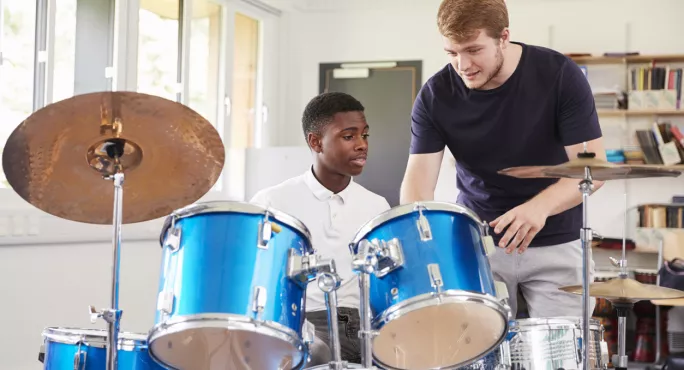A lack of specialist music education teachers is hampering the provision of consistent and good quality music education across schools, respondents to a Department for Education consultation on music education have warned.
An inconsistent approach to music taken by schools and limitations of the curriculum were also cited as reasons why music education is not “fully or fairly delivered” to pupils in England according to a DfE report based on a consultation of music education carried out in early 2020, published today.
Now music industry executives and teachers will form part of a new advisory panel to help produce a national plan for music education next year.
Music: 6 ways Ofsted wants schools to teach music
Opinion: Students want music lessons, so why are they vanishing?
Arts: Schools to fight Covid ‘misery’ with national arts fest
The panel will also be made up of teachers, Music Education Hub leaders and other music education experts, including representatives from the National Youth Orchestra of Great Britain and UK Music.
Darren Henley, chief executive of Arts Council England (ACE), whose independent review of Music Education in England informed the original national plan, will also sit on the panel.
“The responses highlighted that more can be done to support pupils to access music opportunities, in particular citing a lack of opportunities to progress with instrument lessons beyond whole class ensemble lessons,” the DfE report says.
It also found there was “a fairly equal split” between the number of respondents who said that music education is not available to all children and that the quality could be better (47 per cent) and those who said it was being fully or fairly delivered in key stages 1-3 (44 per cent).
“Of those respondents who said that the quality could be better, a large proportion of respondents said that they felt the level of provision being provided often varied between different key stages and by region,” the report adds.
“Reasons given for this included an inconsistent approach to music education taken by schools, the lack of specialist music teachers and limitations of the music curriculum.”
The new national plan for music education will follow the publication of the Model Music Curriculum earlier this year and will “aim to ensure every pupil has the opportunity to sing, be taught a musical instrument and make music with others”, the Department for Education said.
Schools minister Nick Gibb said: “Having the opportunity to be taught and play musical instruments is enriching and fulfilling. I, like many others, wish I’d had a stronger music education and had more of an opportunity to play instruments in my time at school.
“That’s why we want all schools to have a rigorous and broad music curriculum, that inspires their pupils to love music, and the new panel will play a vital part in achieving that by informing the new National Plan for Music Education.
“Their wealth of experience will be hugely valuable to the future of music education, helping to inspire a new generation of musicians in this country.”
Culture minister Caroline Dinenage said: “I’m delighted to have such a brilliant team of music industry experts supporting this refresh of the National Plan for Music Education.
“The panel’s expertise will guide us to ensure that young people from all backgrounds will have access to an exceptional music education. This will not only benefit student wellbeing, but also help grow the pipeline of people participating in our wonderful cultural and creative sectors.”




